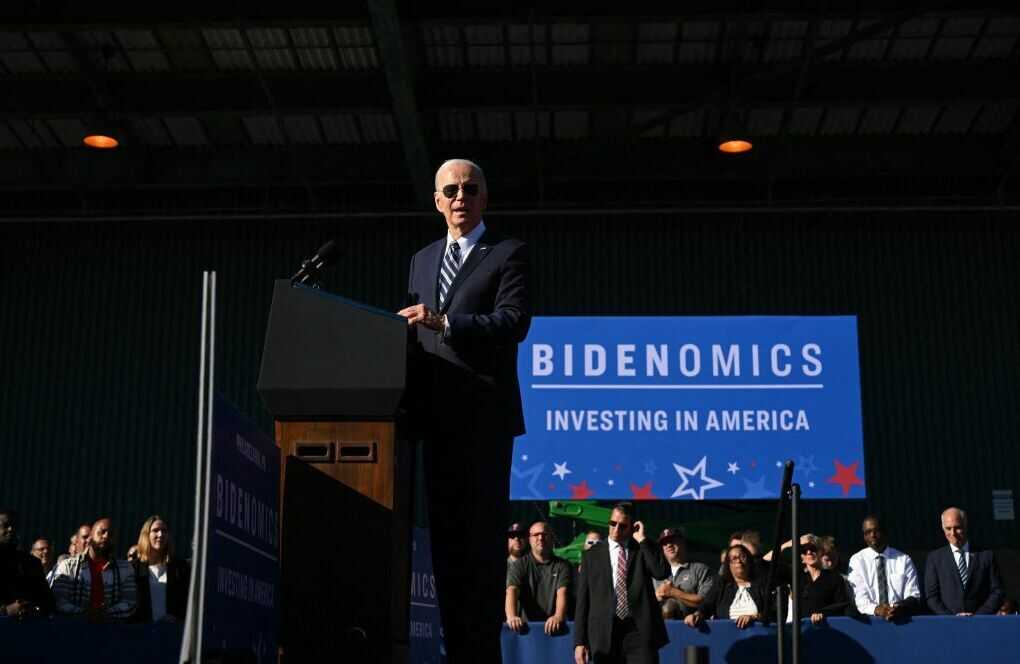California sues oil giants, saying they downplayed climate change. Here's what to know
By Juliana Kim|Michael Copley
In this aerial picture taken on Aug. 21, a vehicle drives through floodwaters following heavy rains from Tropical Storm Hilary in Thousand Palms, Calif. Josh Edelson/AFP via Getty Images hide caption
toggle caption Josh Edelson/AFP via Getty ImagesIn this aerial picture taken on Aug. 21, a vehicle drives through floodwaters following heavy rains from Tropical Storm Hilary in Thousand Palms, Calif.
Josh Edelson/AFP via Getty ImagesThe state of California has filed a sweeping climate lawsuit against Exxon Mobil, Shell, BP, ConocoPhillips, and Chevron, as well as the domestic oil industry's biggest lobby, the American Petroleum Institute.
, filed on Friday in San Francisco Superior Court, claims that the companies misled the public for decades about climate change and the dangers of fossil fuels. It demands the companies help fund recovery efforts related to California's extreme weather events, from rising sea levels to drought and wildfires, that have been supercharged by human-caused climate change.
"Oil and gas companies have privately known the truth for decades — that the burning of fossil fuels leads to climate change — but have fed us lies and mistruths to further their record-breaking profits at the expense of our environment. Enough is enough," .
Oil and gas companies are already facing dozens of lawsuits from states and localities over their role in causing climate change. California's case adds to the legal threats facing America's oil and gas industry, forcing fossil fuel companies to defend themselves against the largest economy in the U.S. and a major oil-producing state.
"California's decision to take Big Oil companies to court is a watershed moment in the rapidly expanding legal fight to hold major polluters accountable for decades of climate lies," said Richard Wiles, president of the Center for Climate Integrity, a group focused on holding fossil fuel companies accountable for their role in driving climate change.
"Whether it's fires, droughts, extreme heat, or sea-level rise, Californians have been living in a climate emergency caused by the fossil fuel industry, and now the state is taking decisive action to make those polluters pay," Wiles added.
Why now?
The lawsuit comes after years of extreme weather events have battered California's economy and killed its residents. In just the past year, California has been inundated with record heat, , unusual bouts of severe rain and snow, and a rising sea level that's threatened the state's shorelines — disasters that studies say were made more likely or more intense due to climate change.
reported that executives at Exxon continued in recent years to raise doubts internally about the dangers of climate change and the need to cut back on oil and gas use, even as the company publicly conceded that burning fossil fuels contributes to global warming.Those efforts inside of Exxon, which continued until 2016, according to the, were happening at the same time that scientists at the company were modeling troubling increases in carbon dioxide emissions without big reductions in fossil fuel consumption. The cited internal company documents that were part of a New York state lawsuit and interviews with former executives.
In response to the article, an Exxon spokesperson told NPR that the company has repeatedly acknowledged that "climate change is real, and we have an entire business dedicated to reducing emissions — both our own and others."
Wiles said in a statement this week that the documents the uncovered will probably be used against Exxon in court.
What are the allegations?
In the 135-page California complaint, the state claims that oil and gas executives knew at least since the 1960s that greenhouse gasses produced by fossil fuels would warm the planet and change the climate. According to the suit, industry-funded reports themselves directly linked fossil fuel consumption to rising global temperatures, as well as damages to the air, land and water.
Despite this, oil companies intentionally suppressed the information from the public and policymakers, even investing billions to cast doubt and spread disinformation on climate change, the state alleges.
"Their deception caused a delayed societal response to global warming," the complaint said. "And their misconduct has resulted in tremendous costs to people, property, and natural resources, which continue to unfold each day."
Similarly, Shell spokesperson Anna Arata said that the company agrees climate change needs to be addressed, but it should be done collaboratively not by legal action.
"We do not believe the courtroom is the right venue to address climate change, but that smart policy from government and action from all sectors is the appropriate way to reach solutions and drive progress," she said in a statement.
Chevron agreed that climate change policy requires coordination. The company also accused California of being "a leading promoter of oil and gas development."
"Its local courts have no constructive or constitutionally permissible role in crafting global energy policy," the company said in a statement.
Exxon, BP and ConocoPhillips did not immediately respond to NPR's request for comment.
Why Exxon?
Exxon worked for decades to create confusion about climate change, even though its own scientists had begun warning executives as early as 1977 that carbon emissions from burning fossil fuels were warming the planet, posing dire risks to human beings.
A study early this year in the journal found that Exxon's scientists had modeled global warming trends with "shocking levels of skill and accuracy," .
Scientists with the United Nations to prevent global warming that would cause more dangerous impacts, like storms and heat waves. Climate scientists say people need to Celsius (2.7 degrees Fahrenheit). The world is currently heading for about 2.5 degrees Celsius of warming.
Climate change is . Over the past two years, the threat of wildfires has led several big insurance companies to in the state or to stop selling new policies altogether in order to avoid paying billions in damages.



